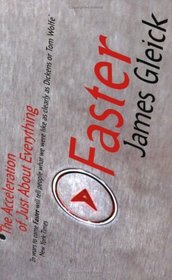This book is not quite as good as Chaos, and it is more of a subjective piece rather than a presentation on the history of a scientific movement - which was essentially the gist of Chaos. However, it's entertaining and thought provoking. Gleick's writing style is enjoyable, and you will flip through this quickly (in a good way).
The idea is a good one, but this book is missing something - there's a lot of writing about the annoying aspects of the acceleration of modern life, but little about why or what it all means, or what it holds for the future (other than things going Even Faster). Gleick is an excellent writer, and did an exellent job with "Chaos" from way back when, and the Feynman bio "Genius," but somehow missed the boat on this one. It's too bad, I do enjoy his thoughts, and I really wanted this book to "say something" to me.
I found Ray Kurzweil's "The Age of Spiritual Machines" from the sam time period to be a much better and more in-depth work on where the accelerated pace of life in general and technology in particular came from, as well as where it's going. I have little doubt I'll enjoy Kurzweil's earlier "The Age of Intelligent Machines" and his current "The Singularity Is Near" as well.
I found Ray Kurzweil's "The Age of Spiritual Machines" from the sam time period to be a much better and more in-depth work on where the accelerated pace of life in general and technology in particular came from, as well as where it's going. I have little doubt I'll enjoy Kurzweil's earlier "The Age of Intelligent Machines" and his current "The Singularity Is Near" as well.
From the back cover: "Do you hit the 'door close' button because the [elevator] doors are taking too long to close? Did you know we work longer, commute longer, shop longer and sleep 20% less than we did a century ago? We are obsessed with making more time, yet a microwave oven saves just 4 minutes a day -- the average amount of time we spend having sex or filling in government forms."





